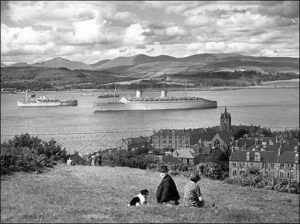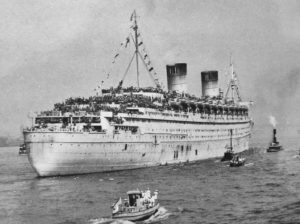July 5, 1945. Stanley is back in the States and has been back in Albany for a few days and writes that “It sure feels good to be home again after twenty-one months overseas.” He arrived home on the 3rd and laid down “about 7 PM on the bed for a while”. He states that he “went out like a light” and woke up at “noon the next day” it being the first chance he got for some solid sleep in three days. He writes that he hasn’t “quite recuperated from the moving around”; and that “it sure feels funny to be sleeping on a soft bed in which you almost sink to the floor after sleeping on canvas bedding.”
Stanley’s letter of the fifth is his first chance to really sit down and put some thoughts on paper. One of the things he does is provide a day to day run-down of his trip home from England. He starts with June twentieth, mentioning that a correspondent from Yank Magazine was on the field to “cover the entire movement of the bomb group from the ETO to the states.” On the 20th they “had to clean the area up at Deenethorpe AA Field” and “make up twenty two separate payrolls one for each reception station.” They had something to eat at about 9:30 PM and “left camp by truck about 2215 hours.” He writes that he got one “last glimpse of Knob Hill, [the] place where we dwelled on the field. [The] sun shone beautifully but looked somewhat sad. Then we got on the train about 2330 hours.” It was not until about one in the morning that the train actually started to move.
At about Noon on the 21st they arrived at Gourock Scotland and were on board the Queen Elizabeth by 1330. Once on board, he writes that he “took a hot salt water bath in a real bathtub” then “toured the ship from one end to the other.” The ship remained docked in the Firth of Clyde for a few days. The anchor was not hoisted until “about 1720” on the 24th.

The Queen Elizabeth in her Wartime Gray paint scheme waiting in the Firth of Clyde off Gourock, Scotland.
He writes that his outfit “got stuck with KP all the way over but…sure made good use of it. We never stood short of food though the whole trip.” Although they “only ate two meals a day” they “had ice cream almost every day.” He also writes that on the 25th it was “foggy outside and rained a bit. The fog horn was blowing about every minute” and when it did “everything would vibrate.”
For most of the trip across the Atlantic, “it rained and was foggy” and “the water was so rough…the boat tossed around”. As they were approaching the coast of the United States they heard, “they were hitting a hurricane” and “there was an 80 mile gale wind blowing.”
On the 29th “the water calmed down a bit and the sun came out for a change. We spotted land about noon that day. We passed the Statue of Liberty about 2PM. It was the first time I ever saw her. A band on a boat greeted us on the river. Some of the boats were decked out in different colored flags. Boy you sure got a funny gay feeling in yourself as we gently glided up the river. We did not get off the boat until after midnight… We then got on a ferry and crossed the river where a train was waiting for us to take us to Camp Kilmer. We got there about 0345 AM 30 Jun 45. …Everyone was really pooped out. …Some officers made a few speeches and most of the fellows slept through it all. We did not get to sleep until about 0530 hrs.”
After sleeping for only about five hours Stanley writes about calling home at about ten in the morning. While at Camp Kilmer he was given a big steak dinner and all of his mail that had accumulated in the states after mail service was stopped to England. They left Camp Kilmer on the first of July and got to Fort Dix, NJ about Noon. They slept overnight and spent the second at Fort Dix where they “were processed” and “got our orders for a rest and recuperation for a period of 30 days at home… We left Ft. Dix at midnight on the second and did not get home until about eight in the morning on the third.” In addition he was issued “sun tans” to wear while home as well as “a shoe certificate and also cigarette rations.” After his thirty days he is required to report back to Fort Dix and from there “I believe we go to Sioux Falls, So. Dakota.”
He writes that he will try to answer all of the letters that he got from Dad and he “hopes that the mess on your side finishes faster so you can come home quicker. As for myself there is a chance of my going to the Pacific but I do hope that by the time we are ready to go there the war ends for good.”
Before closing he notes how things have changed in Albany over the past twenty-one months. “The home and outside and everything else looks so small after being on wide open spaces.” Nonetheless, he writes, “The grass is nice and green outside. Just like a carpet. The cherries are ripe on the tree. The big apple tree next to the schoolyard was cut down. Your pear tree and mine are no longer in existence.” He wraps up, “I guess I’ll finish this letter and go lay down for a while as I am feeling very sleepy.”


